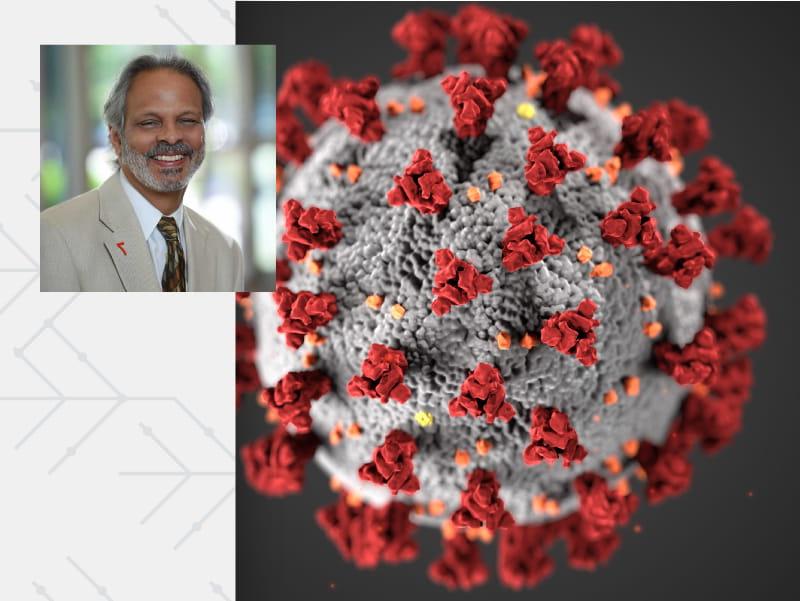Coronavirus precautions for patients and others facing higher risks

爱德华多·桑切斯,硕士.D., M.P.H., FAAFP, the 美国心脏协会’s Chief Medical Officer for Prevention, shares advice and resources for patients and others concerned about the coronavirus.
As we all continue to adapt to life during the COVID-19 pandemic and get into some routine, 我们不能放松警惕,这一点非常重要.
The best way to do that is to stick to the simple things we know can stop the spread of the coronavirus. 你以前听过这些建议, but you’ll keep hearing them because they’re currently our best defense against the virus:
- 保持社交距离,至少保持6英尺的距离. 事实上,尽可能多地呆在家里.
- 勤洗手 用肥皂和水浸泡20秒.
- 不要在公共场合接触物体表面.
- Wear a mask or cloth face covering when you’re out in areas where it’s hard to social distance.
- Cover coughs and sneezes with a tissue and then throw it away. If you don’t have a tissue handy, cough or sneeze into your long sleeve at the elbow fold.
- 尽量不要触摸你的嘴、鼻子或眼睛.
Continue to stay informed about this rapidly changing pandemic. The U.S. 疾病控制和预防中心 提供定期更新和可靠的信息. Be sure to also follow the guidance of your state and local health officials. And you can always find updates for patients and tips to stay healthy at qingdaosp.com.
谁有感染或并发症的风险?
It continues to look like older people with coronary heart disease or high blood pressure are more likely to develop more severe symptoms.
中风幸存者和心脏病患者, 包括高血压和先天性心脏缺陷, may face an increased risk for complications if they become infected with the COVID-19 virus. 的人 糖尿病, 免疫系统受损, chronic lung diseases and other underlying conditions also may be at risk of more severe illness, 根据疾控中心.
Also, 早期国家数据 indicate black people, Hispanics and Latinos appear to be disproportionately impacted. 来自几个城市和县的数据 发现那里的黑人患COVID-19的死亡率更高. 很多黑人已经开始这么做了 更脆弱 心血管和中风的风险,以及 健康的社会决定因素.
如果你是一个重要的工人或需要外出
如果我们离开家,我们都需要格外警惕. Be mindful that every surface is a potential source of infection and that everything you bring inside your house could be contaminated with the virus. Wipe down packages and wrappers, throw away bags and then wash your hands.
如果你是一个重要的工人, you likely have more chances of being exposed to or actually contracting the virus.
The CDC’s new guidance says critical workers who have been exposed may be permitted to continue working if they remain asymptomatic and take additional precautions to protect themselves and others.
Those precautions include pre-screening for fever and other symptoms before work, 定期监察工作环境, 戴口罩,在工作中保持社交距离.
如果你宅在家里
The vast majority of Americans are now being asked to stay home, but safety precautions are still necessary even when you’re away from others. Continue the vigorous handwashing, and clean and disinfect surfaces regularly.
如果你有 紧急,例如 心脏病 or stroke 出现症状请拨打911. 由于新冠肺炎疫情,部分医院人满为患, but 紧急 systems have plans to ensure appropriate treatment. Getting care as soon as possible improves the chances of survival, and first responders are well trained to avoid spreading germs.
与你的医疗保健提供者保持密切联系. 把他们的联系方式放在手边,并询问他们是否 电子咨询或即时通讯选项 是可用的.
如果你一个人住, 收集一份你可以联系的支持联系人名单, 比如朋友, 亲戚, 同事和邻居. 把这些联系方式放在一个容易找到的地方.
盘点你的药物. 确保足够长沙巴足球体育平台使用. Also figure out how you would get refills if you couldn’t leave home. 看看你的药房能不能提供补充药品. Your health care provider or health plan may help advise you here as well.
当然,还要继续保持运动和健康饮食. 和你关心的人保持联系, because feelings of isolation can take a toll on your health and well-being.
如果你有冠状病毒的症状怎么办?
常见症状包括发烧、咳嗽和呼吸短促. 如果你有这些症状,请联系你的医疗保健提供者. 再说一遍,如果你经历了警告信号 心脏病 stroke,请立即拨打911.
If health experts are investigating you or someone in your household as a person with a possible case of COVID-19, or if you or someone in your household is confirmed to have COVID-19 but the person is stable enough to be treated at home, 考虑以下CDC建议的预防措施:
- 确保家中有合适的护理人员.
- Ensure there’s a separate bedroom where the patient can recover without sharing immediate space with others.
- Make sure everyone living in your household can adhere to precautions recommended as part of home care or isolation. 这包括遮住咳嗽或打喷嚏, 无情的洗手, not touching your face and being sure to regularly wipe down surfaces with household cleaners.
- Set up some basic rules for making sure the person being isolated can get food and other necessities with minimal risk.
- 与你的医疗保健提供者保持联系.




